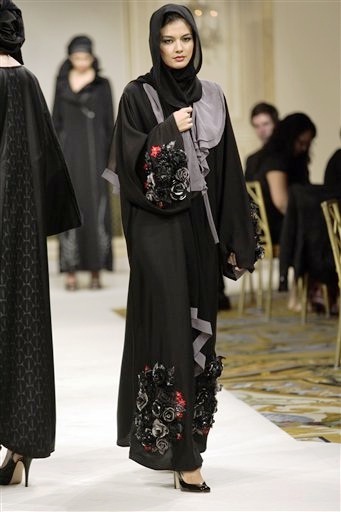Riyadh, 16 Jumadil Akhir 1436/5 April 2015 (MINA) – Saks Fifth Avenue of Riyadh is a gleaming department store in the oil-rich Gulf state. It’s there that associates pull designer abayas with the labels of Paris fashion houses. These floor-length, robe-like dresses are worn by millions of Muslim women.
It’s meant to be modest — but that doesn’t mean it can’t be luxurious.
French labels by John Galliano of Dior as well as Nina Ricci and Jean Claude Jitrois appear in abayas adorned by Swarovski crystals and elaborate embroidery. They range in price for $2,000 to $2,500 for ready-to-wear. Although a couture abaya with a coordinating veil could go for as much as $11,500, according to muslimvillage.com report quoted by Mi’raj Islamic News Agency (MINA) Sunday.
It shouldn’t be a surprise that French fashion is weighing into the burqa debate. Coco Chanel moved women’s clothing away from binding corsets, while Yves Saint Laurent pioneered the feminine suit. Today, as French President Nicholas Sarkozy wages his own war on the burqa and niqab, Givenchy is sending models down runways with their faces covered to protest the government’s stance.
Also Read: Activist Unfurls Palestinian Flag During German Parliament Session, Protesting Gaza Policy
The fashion industry is more often labelled as frivolous than political. But, it highlights an important point. In a globalized world where national borders are now less tightly bound than seams on a dress, institutionalized racism counteracts the gains we’ve made towards a more tolerant world.
While “burqa bans” are being contemplated across Europe, France is probably the most vocal in denouncing the garment. The French ban on face covering (French: Loi interdisant la dissimulation du visage dans l’espace public, “Act prohibiting concealment of the face in public space”) is an act of parliament passed by the Senate of France on 14 September 2010, resulting in the ban on the wearing of face-covering headgear, including masks, helmets, balaclava, niqābs and other veils covering the face in public places, except under specified circumstances. The ban also applies to the burqa, a full-body covering, if it covers the face. Consequently, full body costumes and Zentais (skin-tight garments covering entire body) were banned. The bill had previously been passed by the National Assembly of France on 13 July 2010.
The law authorizes French authorities to fine women US$190 if they are caught wearing a face-covering veil on the street, in public parks, on buses or in shops. Men who force their wives or daughters to wear a burqa or hiqab will face a fine of US$38,000 and face up to a year in prison.
This law is counter-intuitive to women’s empowerment by further isolating a supposedly abused subsection of the population. Worse, it perpetuates stereotypes that Muslim women are submissive and validates racism and Islamophobia in our society.
Also Read: Hundreds Rally in Stockholm to Condemn Israeli Attacks and Ceasefire Violations in Gaza
While countries like Iran and Saudi Arabia use veilings and morality police to control their populations, these practices are not true to Islam. They should rightly be condemned. But, it must also be acknowledged that millions of Muslims around the world successfully marry their religious values with Western culture.
A browse through one of the hundreds of online stores for Muslim women in Europe and North America shows just how closely they can relate.
“If you’re looking for long tops that are very hijab friendly then you have to go to Gap and get your hands on the boyfriend shirt,” says a recent posting on Hijab Trendz, a popular fashion, beauty and entertainment blog for Muslim women, which called the shirt hijabilicious. “It’s perfect because of the length and looseness of the top.”
Rather than seeing the similarities between these cultures, many tend to focus negative values perpetuated by oppressive governments. That focus is now leading to the institutionalizing of the stereotype through a ban — something that only enforces a misconception rather than working towards tolerance on both ends.
Also Read: Mass Protests Erupt in Bologna Against Israeli Teams Ahead of EuroLeague Match
Polls have shown that while the Western world debates the burqa, our image in the Middle East is less than favourable. As feminist media critic Fatemeh Fakhraie has pointed out, while governments work to change the Muslim world’s perception on the West, we do little to improve our own perception of the Muslim world.
That unfortunately is left to runways in Paris where designers take the bold step of using Islamic influences in their collections. But, if Chanel could make the corset passé, maybe today’s designers can introduce tolerance as the latest trend. (T/P3/R01)
Mi’raj Islamic News Agency (MINA)
Also Read: Finland’s Largest Retailer Halts Israeli Product Sales

































 Mina Indonesia
Mina Indonesia Mina Arabic
Mina Arabic